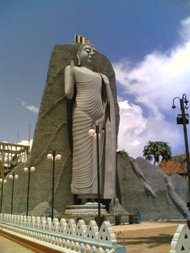All animals Sleep: Why do they?
July 14, 2010, 8:50 pmwww.island.lk

It must be at least 30 years since I slept more than 5 hours a night. When I got married , we shared the bed with an Irish wolfhound , the size of a small donkey. Since my husband died , there have been 3 dogs on the bed and while they change every few years , their habits of wanting to go out every few hours or of squeezing me into a corner or kicking while dreaming never does. Along the way I have developed a very odd feature – I need to be lulled to sleep by a voice and so the TV drones on through the night.
Am I the only bizarre sleeper ? We are told humans need at least 8-hours of sleep . Animals too, need to sleep to stay healthy. Lets look at their sleeping habits.
The Giraffe needs the least of any mammal about 1.9 hours per day in five minutes at a time. The Brown Bat on the other hand sleeps for 19 hours a day ( Closely rivaled by my dogs who only wake for meals, treats , to fight and to ask strangers to adopt them !)
The Asian Elephant sleeps for 3.1 hours as does the deer. The donkey sleeps for 4 hours, the chimpanzee for 11 , the squirrel and domestic cat for 12.5 hours and the lion for an hour more. Dogs usually sleep for around 13 hours every day. Your dog will tend to circle before lying down to sleep. In the wild he would trample down vegetation to create a bed, typically in longer grass where his presence wouldl be concealed. A deep sleep is indicated by the eyelids and whiskers twitching and legs running. The average cat sleeps anywhere from 13 to 16 hours per day. Despite the long hours of sleep that they clock in, they don’t really sleep through an entire night- as victims of their caterwauling will testify to
Bats sleep upside down because their wings aren’t really strong enough to launch them into the air from the ground; hanging means they can just drop into flight. Their talons simply lock into place so they need no energy to hang.
Guinea Baboons sleep on their heels on top of trees. This helps them stay alert while asleep. The Hazel Dormouse balances itself on the branch of a tree safe in the knowledge that any quiver of the twig will wake it up immediately. So does the leopard. Cows and horses sleep standing up and sometimes with their eyes open. Many birds sleep while standing or perching. Some birds, such as pheasants and partridges, sleep on the ground. Water fowl sleep while swimming. Some parrots sleep hanging down.
Dolphins and other large sea mammals keep one eye open and one half of the brain awake at all times to maintain the consciousness required to breathe and to watch for threats. Dolphins are particularly unusual in their lack of need for sleep; a calf and its mother will have zero sleep for the first few months of the baby’s life. Ducks and most birds also keep one eye open and half of the brain awake at all times. Mallards observed sleeping in a line will often post sentries on either end of the group, allowing those in the middle to sleep more soundly. Swainson’s Thrush takes hundreds of naps during the day, each of just a few seconds, while migrating, Migratory birds tends to function well on micro-naps. Albatrosses are known to sleep while flying even while cruising at the speed of 25mph ( Men with a few drinks in them do this too while driving but with less success)
Walruses can sleep and swim at the same time, too. They choose between sleeping underwater or above. A walrus can hold its breath for five minutes, just enough time for a nap. For a deeper sleep, walruses inflate spaces inside their body, called pharyngeal pouches, with up to 13 gallons of air. These act like life-jackets, allowing them to remain in the water by bobbing up and down while keeping their head above for air. For the deepest sleep, walruses will either hook their tusks onto a piece of ice or move to land where they sleep up to 19 hours at one time. Unlike most animals, walruses do not need to sleep every day, and they can swim without stopping to sleep for more than three days. Hippopotamuses spend part of their sleep under water.
When the weather changes and there will less food to eat, many animals simply go into long sleeps for months together to save energy. This is called hibernation in winter and estivation in summer. The Dormouse hibernates six months out of the year, or even longer if the weather remains cool. Reptiles do this in the autumn but it differs from hibernation because they will often wake up to drink water and then return to sleep. Frogs pass the winter hibernating at the bottom of lakes, far beneath the ice. Frogs’ bodies have some natural antifreeze chemicals built into them. The Common Poorwill is unique because it is the only bird to go into a state of hibernation for months, concealed in piles of rocks. The Fat-tailed Dwarf Lemur sleeps in a small cricket hollow for seven months of the year. It is the first tropical primate in which hibernation has been demonstrated.
Most animals yawn, but it’s probably not because they’re sleepy. Dogs yawn to say I love you. Baboons yawn to threaten their enemies. Siamese Fighting Fish yawn only when they see another fighting fish (or their own mirror-image) and will often attack aggressively. Penguins yawn while courting. Snakes yawn to realign their jaws after a meal.
All animals sleep. Why do we sleep? Sleep studies started about 40 years ago. Some theories are: How much an animal sleeps is also determined by its status as prey or predator. Prey animals sleep less because sleep makes them vulnerable; Small animals tend to sleep more than large ones perhaps because energy conservation is a greater problem for smaller mammals as a smaller proportion of their weight is comprised of fat. The only thing that is agreed on is that all of us animals sleep for the same reason: to give the body a chance to repair itself, gain energy, increase memory and provides the brain time to organize its thoughts.
To join the animal welfare movement contact gandhim@nic.in





















































No comments:
Post a Comment